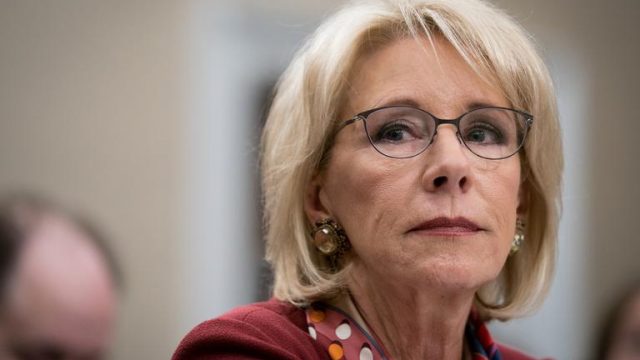There’s Nothing “Horrifying” About Due Process for College Campuses

“What Education Secretary Betsy DeVos wants to do to school sexual misconduct rules is horrifying,” writes left wing ideologue Jim Shaw.
What horrors is Secretary DeVos perpetrating? She “would allow accused students to cross-examine their accusers, only allow colleges to be involved if the assault took place on campus, would make it harder to punish the accused, and would narrow the definition of sexual harassment,” Shaw writes.
That doesn’t seem very horrifying to me. What’s been horrifying is to watch the rise of campus kangaroo courts, where academics largely untrained in the nuances of criminal law attempt to adjudicate criminal cases which put the accused in serious, life-altering jeopardy.
This trend began during the Obama years, which saw the Education Department’s Office for Civil Rights (OCR) dictate to colleges the procedures they must follow when it comes to accusations of sexual misconduct. Those procedures mandated that accusations be substantiated with the lowest possible evidentiary standard, and many of the traditional protections and due process afforded the accused (things like access to legal counsel) were explicitly prohibited.
[mks_pullquote align=”right” width=”300″ size=”24″ bg_color=”#ffffff” txt_color=”#000000″]Blind partisans like Shaw, apparently fine with injustice as long as its perpetrators are playing for the right political team, are defending those abhorrent policies even as DeVos works to roll them back.[/mks_pullquote]
Blind partisans like Shaw, apparently fine with injustice as long as its perpetrators are playing for the right political team, are defending those abhorrent policies even as DeVos works to roll them back.
Let’s look at Shaw’s specific gripes. He says that DeVos will “only allow colleges to be involved if the assault took place on campus.” More serious minded people are wondering why colleges should be deciding guilt or innocence in serious criminal matters to begin with, let alone why their jurisdiction should extend off campus.
He says DeVos would “narrow the definition of sexual harassment,” but out here in reality it’s clear those definitions were overly broad. At that link you’ll learn about one case which “saw a male student suspended for a year because he sent multiple Instagram follow requests to a female student and once looked at her on campus.” Give me a break.
But perhaps the most odious of Shaw’s complaints is that DeVous “would allow accused students to cross-examine their accusers.”
Does this man, with a decades long career in journalism, really not know that this principle is enshrined in the U.S. Constitution? The 6th amendment states, in part, that “in all criminal prosecutions, the accused shall enjoy the right…to be confronted with the witnesses against him.” As a legal matter, that protection is limited to criminal cases, and I’m sure people like Shaw will argue that these campus proceedings aren’t criminal trials, and yet for the accused in those proceedings that’s a distinction with little difference.
If we’re going to ask campus administrations to adjudicate criminal law, does it not follow that we should ask them to afford the accused some of the protections they get in the criminal justice system?
Or maybe we should let all of this be settled in the criminal courts, where we have trained legal professionals and centuries worth of jurisprudence to guide us toward justice in a manner that protects the alleged victims and perpetrators alike?




